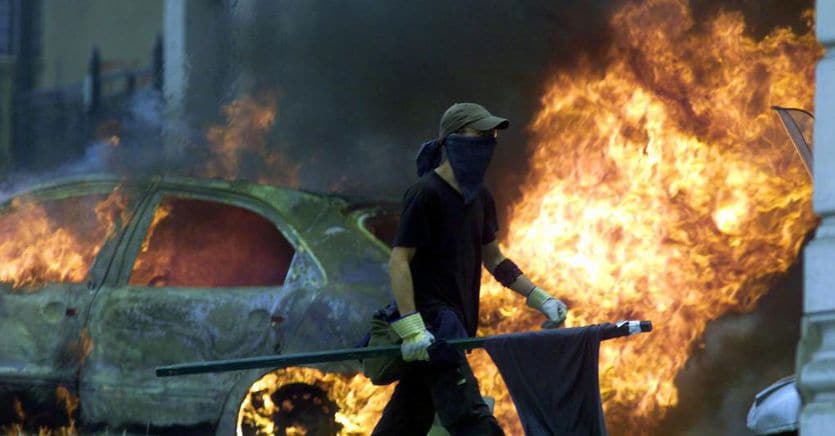It started badly. With fear, which is not a good advisor at all. Far from it. The total inability of the Berlusconi government to understand the reasons and the actual “danger” of the “no global” movements can today, twenty years later, be considered the true cause of many mistakes made at the G8 in Genoa. Confusing everything, Black block and many animated boys with the best intentions, dismissing the protest wave of the late 90s as a mere episode of public order was one of Genoa’s main mistakes. The only exception (of which I was a direct witness) was the attitude of the Foreign Minister of the time, Renato Ruggiero who would have had the task of “cleaning up” the international image of the second Berlusconi government (that of the cover of the Economist “unfit to lead Italy “).
Ruggiero’s role
Ruggiero had already experienced firsthand as the first director of the WTO what it meant to try to dialogue with NGOs and “no global” even when violent fringes of some of them put a city on fire as happened in 2000 in Seattle for the World Trade Summit. Ruggiero summoned to the Farnesina on the eve of the G8 what, at that moment, appeared to be their leader, Vittorio Agnoletto. Ruggiero tried to obtain from Agnoletto a “green light” on the development issues that the G8 would have tackled starting with a precise road map to respect the so-called United Nations Millenium Goals on health, environment and the fight against poverty. But there was nothing to be done. The goal was to break down the red zone. A stalemate which, however, displaced at least part of the movement that had presented itself to the Farnesina with at least a prejudicial attitude towards Berlusconi and his government. Ruggiero also worked to summon a group of high-profile personalities to Rome as “observers” of the summit. The Nobel Prize for Economics, Amartya Sen, a scholar of globalization and its effects, would have wanted to guide the work but declined the invitation. Not so did Mary Robinson, former president of Ireland and former UN High Commissioner for Refugees. It was a totally new world for Berlusconi who, however, willingly lent himself to receiving the personalities.
Loading…
Berlusconi’s attitude
Fear was said. The most frightened was the head of the government. One month before Genoa, on 15 and 16 June 2001, Berlusconi, on the strength of an exceptional electoral success but without yet having presented his program to the Chambers, took part in the European Council of the Swedish presidency in Gothenburg. Berlusconi was disconcerted by the scale of the protests and above all by the very harsh response of the Swedish police that nearly reduced a demonstrator to death.
Interlocution Berlusconi-De Gennaro
A few weeks later Berlusconi gathered all the senior officials involved in the preparation of Genoa at Palazzo Chigi. There was also the police chief, Gianni De Gennaro. Berlusconi stared into his eyes and asked him: “Can you assure me that nothing will happen in Genoa like what we saw in Gothenburg?”. De Gennaro’s answer, reread today, twenty years later, is almost scary. “President, the modus operandi of our staff is totally different from that of the Swedish police.” Berlusconi made one of his faces but did not seem fully convinced. We all know the rest with details that have been enriched over the years. Like those who would like a Minister of the Interior (Claudio Scajola) to directly manage public order operations with the top management of the Police and Digos.
Requests for information from foreign states
After five days (and I was a direct witness of this) the Viminale battery and the foreign exchange switchboard at the most unlikely hours tried to contact Foreign Minister Ruggiero. The German colleague Ioshka Fisher, from Austria, Benita Ferrero Waldner and from France Hubert Vedrine, are always looking for him. Everyone wanted to know the same thing: what happened to their boys and their girls who had gone to Genoa. The families hadn’t known anything for days. A situation like Argentina or Chile that cast an even more sinister shadow on a summit already stained with Giuliani’s blood and that erased any possible success of that summit that first launched an AIDS fund and tackled issues that would later be have been the daily bread of all subsequent G8 and G20 summits until the one to be held in Rome at the end of next October. Giuliani’s death was a severe blow to Berlusconi’s image. At that moment the simplest thing was to identify all the responsibilities of De Gennaro. Berlusconi summoned Ruggiero and asked to probe the UN secretary general, Kofi Annan to find out if the name of De Gennaro would have been appreciated at the Glass Palace as the successor of Pietro Arlacchi to the UN anti-drug in Vienna he was leaving us. Annan, as a seasoned diplomat, immediately understood the problem (promoveatur ut amoveatur) and invented a shortlist of candidates among which to include De Gennaro. But it ended there. In the meantime, no one had even informally communicated to De Gennaro that someone was packing his bags for Vienna. Years later, the former police chief confessed to Gianni Letta (who knew everything): “if you had told me how much he earned in Vienna I would have accepted immediately”.
